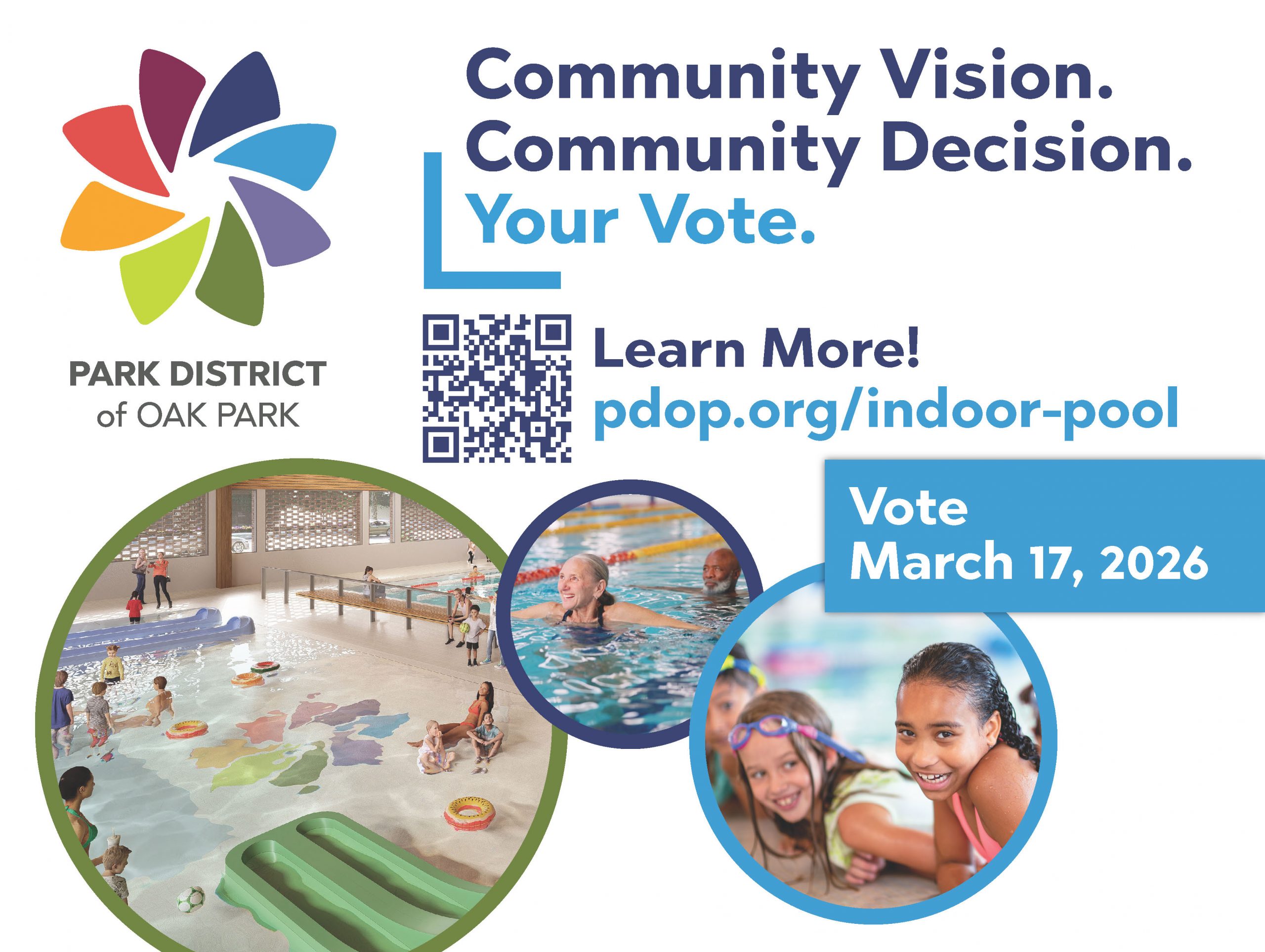INNOVATION
The Park District of Oak Park is continually piloting projects and adapting ideas from outside of the field of parks & recreation. These projects are designed to have measurable outcomes and have the potential to be duplicated, whether at a larger scale in our own community, or by other park & recreation agencies and local governments across the country. Some ideas are big and others are small, but all have been implemented in an attempt to make a positive impact on the way that we serve and collaborate with our community.
The Park Distirct of Oak Park received the J. Robert Havlick Award for Innovation in Local Government from the Alliance for Innovation for our submission, “Launch Pad: Getting Good Ideas Off the Ground.”
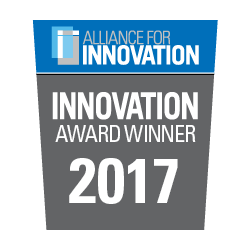
How is innovation promoted at the Park District of Oak Park?
The Park District utilizes an idea-sharing platform, Launchpad, where all employees can post ideas big or small. All employees are introduced to Launchpad during their new hire orientation. To promote engagement with the platform, awards are distributed for posting ideas, commenting, and assisting in launching ideas.
The Innovation Commitee meets monthly and is responsible for carrying out ideas posted on Launchpad.
FEATURED PROJECTS RESULTS
SOLAR PANEL INSTALLATION
Strategic Objective: An idea submitted in March 2020 to install solar panels on the landscaping trailer was selected in 2021 and incorporated into the 2022 budget. These panels will help charge batteries that will allow the District to move away from gas powered landscaping tools and switch entirely to an electric fleet with a sustainable, eco-friendly power source.
This project was completed in 2022 and staff are using the solar panels on the landscape trailer to recharge the battery powered landscape equipment being used to maintain the parks.
POP-UP BIKE
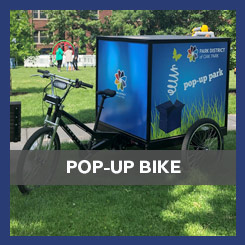 Strategic Objective:
Strategic Objective:
Customer and Community Focus: To engage the community
Overview:
The Park District sought a way to engage the public in the parks with activities and games to make recreation accessible to all.
2019 Plans:
During the Alliance for Innovation Transforming Local Government Conference, staff learned about the engagement van project from Goodyear, AZ. The Park District launched the Pop-Up-Bike program in the summer of 2019 where staff engage park patrons with new recreation activities every week.
MEMORIAL PLAQUES
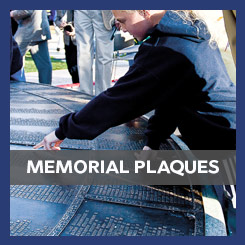 Strategic Objective:
Strategic Objective:
Customer and Community Focus: To anticipate future needs
Overview:
The Park District sought to refurbish all historic memorial name plates.
2019 Plans:
A few years ago, the Park District refurbished the Peace Triumphant Memorial at Scolville Park. As part of its innovation program, staff expanded the program to refurbish name plates at Field Park, Andersen Park, Stevenson Park, Carroll Park and Longfellow Park. The Park District also created a new social media campaign to build awareness about the project.
WATER CONSERVATION
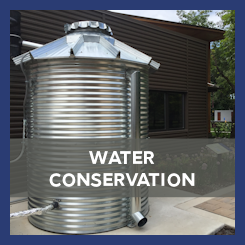 Cistern Installation for Water Conservation
Cistern Installation for Water Conservation
In a response to rising water costs, a desire to conserve this natural resource, and the recognition of the energy consumed in pumping and treating water from Lake Michigan, the Park District recognized the opportunity to collect water for use in parks & facilities. Three below ground water cisterns have been installed and are collecting water from the splash pad and being repurposed into the irrigation system:
- Austin Gardens - A tank was installed to collect rainwater and divert it for use in flushing toilets at the Environmental Education Center
- Longfellow Park - A tank has been installed and is currently being tested to collect and treat water from the park's splash pad to reuse for athletic field irrigation
- Field Park - A tank is scheduled to be installed in 2017 to collect and treat water from the park's splash pad to reuse for athletic field irrigation
Using sensors and utility use data, the Park District will be able to measure the amount and cost of the water saved by these cisterns in order to determine the effectiveness of the pilot.
Pilot Status: 3 below ground water cisterns have been installed and are collecting water from the splash pad and being repurposed into the irrigation system.
More Information:
- Wednesday Journal Article - "Cisterns Planned for Several Parks"
LAUNCHPAD (EMPLOYEE IDEA BOARD)
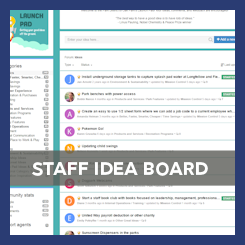 Strategic Objective:
Strategic Objective:
Organizational Excellence: To strive for innovative operational excellence.
Overview:
Based on feedback given by both staff and the public in prior studies and plans, the Park District recognized that there was a desire to proactively support and share innovative ideas for improving Park District operations and programs, parks, and services provided to the community. As part of these efforts, an innovation leader and team was designated and goals were developed. One of these goals included finding a way to allow staff to identify, share, and fund new ideas at the Park District.
History:
2014
The innovation team decided to create a web-based platform that would allow staff from all levels to share, vote and comment on ideas. Using a portion of non-resident fees, the Innovation Team would decide what ideas to launch. The program was called Launch Pad.
2015
Launch Pad was rolled out to staff in January 2015. At the end of 2015, staff had submitted 187 ideas with 29 selected for further investigation and future implementation. The software solution worked well for the innovation team, although it was more difficult to both grant and encourage use of by our seasonal staff (lifeguards, camp counselors, etc.).
2017
The program received the J. Robert Havlick Award for Innovation in Local Government from the Alliance for Innovation for our submission: "Launch Pad: Getting Good Ideas Off the Ground".
2018
The Innovation Team recognized that Launch Pad participation was declining, there was a lack of follow-through, there was no criteria for selecting ideas, and there was a lack of clear return on investment. The Innovation implemented Launch Pad 2.0 with a new process, engagement strategies, and tracking mechanisms. These included:
- Engaging departments
- Streamlining the idea selection process
- Implementing a new criteria of feasibility, connectivity, and effectiveness in deciding what ideas to fund
- Awarding incentives for ideas launched, posted, and comments and votes
- Holding a big ticket contest where staff pitch and vote on certain ideas directly at all-staff meetings
- Introducing the Le Good Try Award showcasing ideas that didn't work and what we learned from them
- Challenging of the month to encourage more ideas
- Introducing a new dashboard and all-staff survey to determine effectiveness of program
- Creating a horticulturist in training program at the Conservatory. This program was scheduled for 2020 but COVID-19 delayed it for two years. The program was relaunched in 2021 as part of the 2022 budget process.
2019
The Park District of Oak Park presented on Launch Pad at the Alliance for Innovation's Transforming Local Government Conference in April.
2020 Plans
To recognize everyone involved in the innovative process, the Innovation Team plans to introduce new awards for those implementing new ideas. In addition, Launch Pad will allow staff to share operational challenges so that the Innovation Team can review, provide insight, and new solutions to address them.
A Launchpad idea occurred to switch to compostable bags to send dirty/wet clothes home with preschool students was selected. This will further eliminate waste by eliminating plastic bags from this program.
More Information:
- Software Vendor: UserEcho
PERFORMANCE DASHBOARD
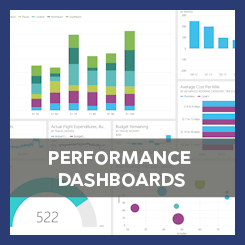 Strategic Objective:
Strategic Objective:
Organizational Excellence: To strive for innovative operational excellence.
Overview:
The Park District sought a way to measure performance, providing an objective and quantifiable way to see successes and areas in need of improvement. The Park District performance management program allows us to:
- Communicate priorities internally among employees, as well as externally to the Board of Commissioners, citizen committees, and the public;
- Learn how the Park District’s present state relates to past performance and future plans;
- Demonstrate progress towards meeting its mission, goals, and objectives;
- Determine which policies, programs, facilities, and services most effectively serve the community’s needs;
- Provide direction for allocation of funds, staff, and other resources, and;
- Offer transparency and accountability to the public.
History:
2013
The Park District implemented a new performance management system. Specific performance indicators were selected centered around the Park District’s mission and strategic initiatives.
In an effort to minimize the amount of time spent by staff manually collecting and reporting data to submit for on-going performance measurement updates, the Park District decided to add the implementation of dashboard software to this project. Staff selected software that had the potential to:
- Allow the Park District to determine & display its own custom performance measures (versus choosing from a pre-determined list)
- Automatically pull live data directly from Park District databases (when available)
- Display data visually for all staff to see
- Analyze data for quicker use by staff
2014
The performance measurement program and accompanying dashboards were introduced to staff. Staff had access to the dashboards on a daily basis and refinements were made throughout the year. The public also has real-time access to data on the website as well. Quarterly meetings were held with management staff to specifically discuss the status of the performance measures with updates then presented to the Park District's Board of Commissioners.
2018
We redesigned the staff quarterly meetings to focus on the story behind the data, identifying what challenges/opportunities the Park District faced/faces and what actions will be/were taken to improve. This analysis was added to the website along with quarterly and annual Board reports. Department dashboards were also launched focused on metrics impacting them such as Special Facilities, Marketing, Customer Service, Conservatory, and Recreation. In 2018, the Park District met about 67% of its target measurements (23 out of 34). 18% of its measures fell within 10% of their targets and about 15% fell outside. The District was slightly behind its performance from 2017 where we met 77% of our targets.
SOOFA INSTALLATION
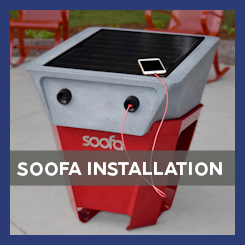 To add to the Park District's increasing Smart Parks efforts, the Park District placed standalone solar-powered units designed to charge phones and monitor park conditions in 4 parks including Scoville Park, Lindberg Park, Taylor Park, and Mills Park. Called Soofa Cores. The devices allowed park users to charge their phones while also giving the Park District a better understanding of how people use the parks by counting the number of wi-fi devices that pass by the units.
To add to the Park District's increasing Smart Parks efforts, the Park District placed standalone solar-powered units designed to charge phones and monitor park conditions in 4 parks including Scoville Park, Lindberg Park, Taylor Park, and Mills Park. Called Soofa Cores. The devices allowed park users to charge their phones while also giving the Park District a better understanding of how people use the parks by counting the number of wi-fi devices that pass by the units.
History:
The Park District installed the solar stations in 2016. We also built a new dashboard estimating the total number of people visiting Scoville Park, Lindberg Park, Taylor Park, and Mills Park and number of charging sessions. Working with a Soofa data scientist, the Park District examined how to leverage the data including determining how many people are in the parks after hours and what level of usage leads to maintenance concerns. Ultimately, we determined there wasn’t enough clear return on investment to continue investing in Soofa. While the phone chargers are still active, the Park District discontinued its subscription.
Pilot Status: Not Successful
More Information:
- Chicago Tribune Article: Scoville Park offers new solar-powered charging stations
- Wednesday Journal Article: Free Phone-Charging Units Installed in Four Parks
- Governing Tech Article: NYC's Smart Bench Pilot to Give Detailed Sense of Usage Trends in Highbridge Park
- Vendor: Soofa
- Soofa's Data Privacy Policy
CUSTOMER KIOSKS
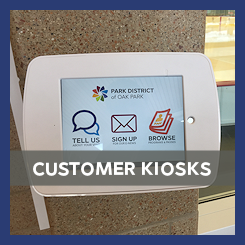 Overall, the Park District has collected a great amount of feedback from program participants through surveys distributed during and after the completion of recreation programs. However, collecting this same type of feedback from park & facility visitors is more challenging because as public facilities, the Park District has less information regarding about who uses our parks and facilities versus our programs that require pre-registration.
Overall, the Park District has collected a great amount of feedback from program participants through surveys distributed during and after the completion of recreation programs. However, collecting this same type of feedback from park & facility visitors is more challenging because as public facilities, the Park District has less information regarding about who uses our parks and facilities versus our programs that require pre-registration.
In an effort to gain new feedback from customers about their experiences in our parks and facilities, the Park District has placed tablets in 3 facilities - Ridgeland Common Recreation Complex, the Gymnastics & Recreation Center, and the Oak Park Conservatory - that allow visitors to complete a brief survey about their visit. Responses to the surveys are automatically integrated into the overall park & facility visit survey results available to staff through the Park District's dashboards. Functionality was also added to the kiosks prior to launch that would allow visitors to sign up for Park District e-newsletters and browse Park District recreation programs online.
Care was taken to select hardware and software that indicated that it could hold up to use (and possible abuse) by the general public and remain secure when nearby customer service desks were closed.
Results: Unfortunately, we did not receive many survey comments. Another problem was the tablets were used inappropriately. As a result, we have taken down the tablets and instituted a new process where all full-time staff visit a park/facility every month to engage patrons. The results of this change have led to over 500 surveys taken annually.
Pilot Status: Not Successful
More Information:
- Hardware Vendor: lilitab

